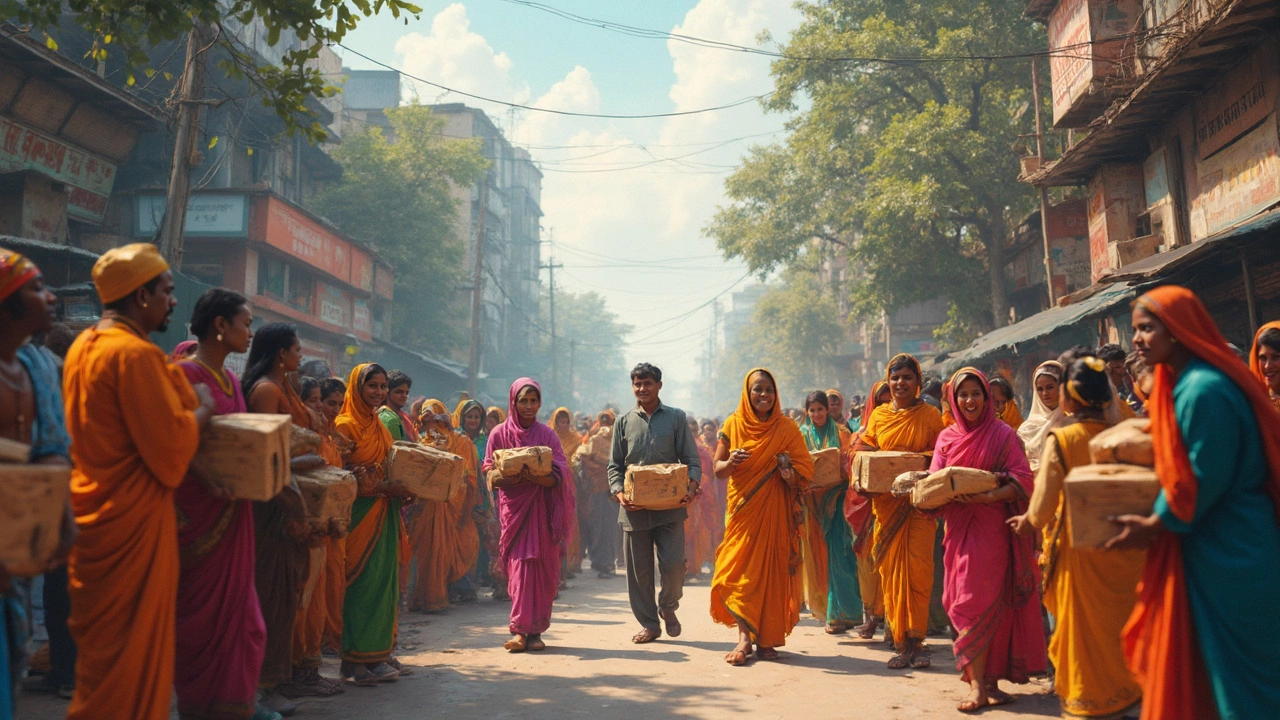Who Benefits More from Volunteering? A Surprising Dual Advantage
 Feb, 19 2025
Feb, 19 2025
Volunteering is one of those activities where the more you give, the more you get back in return. Sounds like a cliché, right? But hear me out. When you decide to volunteer, you're not just helping others—you transform yourself in the process.
Ever thought about how volunteering impacts communities? Sure, cleaning up a park, serving meals, or tutoring kids all have obvious benefits. Communities thrive when people care enough to lend a hand. But here's the kicker: so do you. You might start volunteering with the noble intention of helping others, but before you know it, you're reaping the rewards yourself.
If you're thinking it's all just about feeling good, it goes deeper than that. Volunteering opens doors to new skills, networks, and even boosts your career in unexpected ways. Just ask someone who's been volunteering for a while, and they'll likely tell you how it changed their perspective on a whole slew of things.
- The Two-Way Street of Volunteering
- Volunteering's Impact on Communities
- Personal Gains from Volunteering
- Real-Life Volunteering Stories
- How to Get Started with Volunteering
The Two-Way Street of Volunteering
Volunteering is often seen through a one-sided lens: it's about helping others. While that's undeniably true, there's another angle—this volunteering gig is like a mutual win. You're giving, but you're also gaining a lot more than just good karma points.
How Communities Benefit
Communities see tangible change. Local parks get cleaner, literacy rates improve as volunteers tutor children, and food shelves stay stocked because folks like you show up. For instance, U.S. volunteering efforts have contributed billions in services. That's not small change! It’s real impact that helps communities thrive and grow, making life better for everyone involved.
The Personal Payoff
Now, let's flip the coin. When you donate your time, you're not just investing in the community—you're making a smart investment in yourself. Personal growth is a biggie here. Maybe you start out volunteering to shake up your routine, but you end up gaining skills you didn't know you needed.
Not to forget, there's the whole well-being factor. Spending time volunteering has been linked to feeling less stressed and more connected. Talk about a mood booster! A survey by VolunteerMatch found that a whopping 96% of volunteers felt happier when they helped others.
The Surprise Beneath the Surface
Something else to chew on: your resume. Employers love seeing volunteer work because it shows commitment, teamwork, and lots of other things that are hard to measure but super valuable. Plus, it's a chance to network without the awkward small talk.
So, who benefits more? It's not a straightforward answer, but maybe that's the point. This two-way street of volunteering means that every step you make to help others is a step that helps you grow, learn, and even have a better day.
Volunteering's Impact on Communities
Community work can seem like just a drop in the bucket, but when you look closer, it's easy to see how those efforts add up. Volunteering makes a real difference by addressing immediate needs and laying the foundation for long-term benefits.
Filling Critical Gaps
Many organizations rely on volunteers to fill roles that aren't in their budget. Imagine your local food bank; they're probably running on a tight string. By stepping in as a volunteer, you become an essential part of maintaining daily operations, ensuring that food reaches every family in need.
Building Stronger Ties
Ever noticed how events like neighborhood clean-ups or community gardens bring people together? These activities deepen community bonds, helping folks feel more connected to their surroundings and each other. The stronger these ties, the more resilient a community becomes.
Sparking Change
The ripple effect of community service can lead to significant change. Consider movements where volunteers pushed for sustainable practices or educational outreach. Their efforts often spark awareness and inspire others to join in, creating a wave that's hard to ignore.
Take this example: volunteering for a reading program at your local school can improve literacy rates over time. A small team of dedicated individuals can change the educational trajectory of countless kids.
By the Numbers
Just to give you a sense of scale, here's a stat: In the U.S., volunteering adds an estimated $200 billion to the national economy each year. That's a huge chunk of change and proves how deeply embedded volunteering is in community success.
| Volunteering Facts | Impact |
|---|---|
| Estimated annual economic value | $200 billion |
| Approximate U.S. volunteer count | 77 million |
| Hours volunteered annually | Over 7 billion |
These statistics aren't just numbers—they're proof of the profound impact volunteering has on shaping communities. When you volunteer, you're part of a larger movement that strengthens and enriches the very fabric of society.

Personal Gains from Volunteering
Alright, so you're on the volunteering train, and while you're at it, you're wondering what it really means for you. Let's break it down. When you volunteer, sure you're doing good—but you're gaining big time too. The personal growth is real, and it's one of the best-hidden perks.
Building New Skills
Think of volunteering like this amazing playground for skill-building. You're tossed into situations that you might not encounter in your day job. You might learn how to lead a team, manage resources, or even improve public speaking. And guess what? These skills don't just sit on a shelf—they’re the kind you can bring into your professional life.
Networking and Meeting New People
Volunteering also throws open doors to meet folks you otherwise wouldn't cross paths with. It's not just about expanding your circle—it's connecting with people who share similar passions. You never know where a connection may lead, whether it's a lifelong friend or a professional opportunity.
Boosting Your Mental Health
Here’s a fact: volunteering is a mood booster. Studies have shown it can decrease depression and increase life satisfaction. Why? Because helping others gives a sense of purpose and meaning. It's like instant happiness packed in every hour you help out.
Career Benefits
Don’t underestimate the career shots you can get from volunteering. Employers love seeing candidates who've got volunteer experience. It shows you’re proactive and committed. Plus, the skills you pick up can make you a more attractive candidate. It’s not unusual for a volunteer opportunity to turn into a job offer down the road.
Personal Fulfillment
Finally, there’s the simple fact that helping others just feels good. Volunteering can ground you, remind you of life's basics, and often instill a deep gratitude for what you have. Experiencing these feelings makes the effort worth it. Remember, investing in others often means investing in yourself too.
| Benefit | Percentage of Volunteers Reporting |
|---|---|
| Improved Skills | 60% |
| Better Social Ties | 45% |
| Enhanced Well-being | 55% |
So, if you haven't dipped your toes into the volunteering pool yet, maybe it's time. Not only do you gift communities with your presence and effort, but you also walk away with personal growth that no classroom can teach.
Real-Life Volunteering Stories
When we talk about volunteering, it's easy to get lost in sweeping statements, but nothing beats real stories from people who've been in the trenches. Let's dig into some amazing anecdotes that show just how much a simple act of giving can pay you back.
Meet Sarah: The Career Booster
Sarah was a recent college grad who couldn't land a job in her field. Frustrated, she started volunteering at a local animal shelter. Though it was far from the corporate dream job she imagined, she found herself managing adoptions and setting up fundraising events. Little did she know, those skills would catch the eye of a hiring manager at a PR firm. She now credits her role at the shelter for her unexpected job in communications.
James: Finding Community and Purpose
For James, retirement was supposed to be a world of relaxation, but instead he felt isolated. His daughter suggested he try volunteering at a community garden. Now, James not only grows vegetables but has also sprouted friendships that make him feel like a vital part of something bigger. His weekly gardening group now feels like family.
Lila's Lesson in Empathy
Lila was your typical high school student, more interested in social media than social causes. Enter a mandatory school project that required volunteer service hours. She reluctantly signed up to help at a soup kitchen. Fast forward a few months, and Lila continues volunteering long after the project ended. She realized how much it taught her about empathy and understanding different life circumstances.
| Volunteer | Activity | Outcome |
|---|---|---|
| Sarah | Animal Shelter | Career Boost |
| James | Community Garden | Social Connection |
| Lila | Soup Kitchen | Empathy |
These stories show that volunteering offers a lot more than just a warm fuzzy feeling. It can give your career a shot in the arm, fill your social calendar, and teach you life lessons you never saw coming. Whether it's monetizing your hobbies, connecting with others, or finding unexpected life-changing truths, volunteering can truly be a game-changer.

How to Get Started with Volunteering
Want to jump into the volunteering world but not sure where to begin? Let's walk through the basic steps to help you get started without any hassle.
Step 1: Identify Your Interests
First things first, what are you passionate about? Maybe it’s education, the environment, or community service that excites you. Identifying what you care about most helps narrow down volunteer opportunities that resonate with you.
Step 2: Research Opportunities
Thanks to the internet, finding volunteer opportunities has never been easier. Websites like VolunteerMatch and Idealist connect you with causes that need help in your area. Check out local community centers, churches, or non-profits for upcoming events or ongoing projects.
Step 3: Consider Your Skills
Think about what you’re good at. Do you have a knack for organizing events, or perhaps you’re great with kids? Leveraging your skills not only benefits the organization but also makes you feel more competent and engaged.
Step 4: Check Your Schedule
Make sure you can commit the time before you dive in. Most groups are flexible, but it's crucial to align your availability with their needs to avoid overstretching yourself.
Step 5: Sign Up and Take Action
Once you find an opportunity, reach out. Many organizations require an application or interview to get to know new volunteers. Be proactive about following up if you don’t hear back right away.
Thinking about the benefits of personal growth? Don’t forget that the helping hand you extend not only supports others but also adds rich experiences to your journey. Start small if needed, and watch how these small efforts create waves of change both in the community and within you.